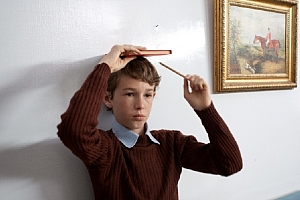A grammar is a system of rules, a structure in which meaning can be created and communicated between individuals who share a common language. “Intimate Grammar”, a film by Nir Bergman, is a poignant investigation of the metaphoric and emotional terrain of grammar, through the experiences of Aharon Kleinfeld, a boy growing up in Jerusalem of the 1960s. Based on the novel “The Book of Intimate Grammar” by David Grossman (Hebrew 1991), the film is one of eight Israeli films competing for the Haggiag Family Awards in memory of Robert Nissim Haggiag for Best Full-Length Feature in the Jerusalem Film Festival.
Passed on from parent to child, grammar comes naturally to native speakers of a language, acquired without effort or consciousness. A three year old is easily more of an expert than the student of a foreign language who labors painfully to memorize a set of rules.
Within the context of a shared grammar we know what to expect: we can expect to understand others, and in turn, to be understood. What happens when the rules are broken? When the familiar rules no longer apply, or have been forgotten? What happens when the practitioners of a language are not native speakers?
These questions are part of the history of every language as it changes over time, reinvented and reinventing those who speak their lives within its codes of meaning. Incremental changes are continuously, often imperceptibly integrated into the language. A dramatic change can cause a rift in the continuity of language and meaning, a break in the system which from the perspective of history can be described as a new grammar.
Viewed from within, from an intimate perspective, it is a tale of turmoil and uncertainty.
The film’s opening scene sets certain systems of meaning and expectations in motion. A black and white newsreel with voice-over narration of Independence Day celebrations in Israel, it situates the narrative historically and also signals its own preoccupation with history, and its representation. The documentary mode soon shifts into the surreal as a single string of lights begins to spin into the vortex of memory, the inner reality of remembered images. Color enters the picture as history is seen through the eyes of an individual: a ten year old boy sitting on a chair: looking, thinking, and dreaming.
On the edge of childhood, Aharon’s adventures are those of any imaginative boy stumbling through the first stages of adolescence. Trying to figure out the world around him, learning the grammar of family, friends, school and the wider context of the Israeli society in which he lives. Yet at the same time, he is learning about himself, who Aharon Kleinfeld is, and who might he become.
Those first moments of the film reveal so much about Aharon and his world. Suspecting her of being a spy, Aharon and his friends have snuck into the apartment of his upstairs neighbor, Mrs. Blum. Looking for clues among the period décor, with its record player, dark wood cupboards and knick-knacks – all so precisely selected and placed that it feels as though the movie was simply filmed in the 60s – one of the boys touches a black bra that has been left out, while Aharon stands mesmerized before a reproduction of Picasso’s Guernica. Aharon is clearly the exception to the rule.
As established in those first moments, Aharon’s individual experience plays out against the experience of an entire generation. This is a generation growing up in the new State of Israel. There is little privacy in Aharon’s neighborhood – everyone’s laundry is literally in plain view, hanging in the communal yard. Inside, the apartments are small, the friction intense, and the walls are thin. Secrets are hidden within the dark cupboards, yet keeping up appearances – literally and figuratively – is essential. Aharon’s friend Smitanka is growing up in a single parent home, his father long gone. Throughout the film (which covers a time span of several years), both Smitanka and his mother stubbornly maintain that the father is temporarily away on business in Africa.
Yochi, Aharon’s older sister, refuses bread at dinner because her ballet teacher called her a “cow”. The argument that ensues could almost take place at any ordinary dinner table in any home where there is a teenage girl, but this is not an ordinary dinner table. Aharon and Yochi’s parents are Holocaust survivors, bread means more to them than calories and carbohydrates, it is survival, it is life itself – and one can never refuse life. Later, in the bedroom which she shares with her brother, hidden away from the prying eyes of her parents, Yochi eats a sandwich. The strength of this film lies in moments such as these – conveying the details of adolescence with sensitivity and precision, and at the same time alluding to a wider context of cultural, historical associations.
To create our own rules, our own grammar, is to risk a loss of understanding and meaning. Yet Aharon is growing up in a world where these systems have broken down, a discontinuous world. Aharon, born in the new State of Israel, is raised by parents who came of age in the Holocaust. Aharon’s parents not only lost their parents, they lost their entire world. They system they understand, one born of their experiences in the Holocaust, is disconnected from the culture in which they are bringing up their own children. Aharon’s father tells him: “Don’t be an int’lectual [sic], an artist. They died first over there.” Fortunately for the viewer, Aharon is listening, but his thoughts and feelings remain his own, creating an inner world of poetry, beauty and mystery.
Aharon is confined by a system, several systems – body, family, society – he doesn’t always understand, and even when it is understood rationally, emotions don’t always comply with the system. His desire for certainty and security is in conflict with his desire for independence and adventure. Constantly exploring and testing the limits of these systems with intelligence, daring and humor, Aharon takes the viewer on an intimate and unforgettable journey.
AYELET DEKEL







Comments are closed.